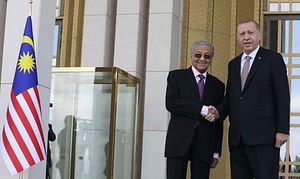Earlier this month, Malaysia and Turkey inked a number of security-related agreements in a bilateral summit meeting held in the Southeast Asian state. The agreements spotlighted the continuing attention that the two countries have placed on advancing the defense aspect of their broader bilateral relationship.
While Malaysia and Turkey, two major Muslim-majority countries, have long had diplomatic relations, the advancement of defense ties has been a more recent development. Over the past few years, Turkish defense firms have been attempting to make inroads in several areas, including armored vehicles and shipbuilding. And following the victory of the Pakatan Harapan government led by Mahathir Mohamad in a shock election in May 2018, we have seen attempts to bolster collaboration still further, be it in terms of new deals between firms on both sides or attention to areas such as aerospace, which we saw during Mahathir’s visit to Turkey earlier this year.
Earlier this month, the defense aspect of the relationship was in the spotlight again during a summit meeting between the two countries. During a 45-minute meeting between Malaysian Prime Minister Mahathir Mohamad and Turkish President Recep Tayyip Erdoğan on December 18 on the sidelines of the Kuala Lumpur Summit (KL Summit), a development, which had attracted its fair share of headlines over the past few weeks, defense issues were an important part of a conversation that also touched on other areas including economics and science and technology.
Per the Malaysian Prime Minister’s Office, the two sides exchanged “13 instruments of cooperation” between companies in the defense sector in both countries. These included a memorandum of agreement (MoA) between Sapura Secured Technologies Sdn Bhd and Aselsan Electronic on the Domain of Military Communication; a memorandum of understanding (MoU) between Havelsan Hava Electronic and AMP Corporation Sdn Bhd on Coastal Radar Surveillance; and an MoU between Tijan Galaxy Aerospace Consortium Sdn Bhd and Baynar Makina on Cooperation, Partnership, Knowledge Sharing, and Technology Transfer of Unmanned Aerial Vehicle and Services.
The areas of focus — such as UAVs, coastal radar surveillance, and military communications — came as no surprise. It is in line with several other recent developments, including the inking of pacts between the two sides at events such as the Langkawi International Maritime Exhibition earlier this year and Mahathir’s past visit to Turkey. But it reinforces the notion that the two sides are continuing to pay attention to the security aspect of ties within the broader diplomatic relationship.
Few additional specifics were publicly disclosed about the private deliberations between the two sides, including the details on the pacts themselves as well as specific timelines or funding amounts. Nonetheless, the defense aspect of the relationship will continue to be important to watch within broader ties into 2020 and beyond.

































